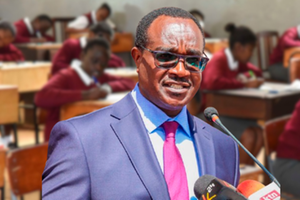
A voter casts her vote during the 2017 General Election.
| File | Nation Media GroupPolitics
Premium
Row over ‘scheme’ to delay 2022 polls, extend Parliament’s term
A row has erupted over the date of the next elections following an alleged plot to extend the tenure of Parliament that would effectively lengthen President Kenyatta’s reign.
Deputy President William Ruto’s allies have alleged the plot to postpone the General Election that is due in August next year, ostensibly to facilitate conclusion of the Building Bridges Initiative (BBI) process and buy more time to plan the Kenyatta succession.
Supporters of the constitutional change bid insist that it’s foolhardy to hold the polls before the issues that precipitated the 2017 post-election crisis are addressed through the BBI, whose fate now lies with the Court of Appeal.
Dr Ruto’s allies have vowed to resist the attempt, arguing that the conditions contemplated in the constitution for extending the term of Parliament — such as a war — do not apply currently.
“We are aware that they are working round the clock to extend the life of Parliament so that they can remain in power but this will be resisted by Kenyans,” said Mr Johnson Muthama, chairman of the Ruto-linked United Democratic Alliance (UDA).
Resist attempts
MPs backing Dr Ruto’s presidential bid, including Didmus Barasa (Kimilili), Daniel Rono (Keiyo South), Benjamin Washiali (Mumias East), Sylvanus Osoro (South Mugirango) and other politicians such as Murang’a senator Irungu Kang’ata, former Kakamega senator Boni Khalwale and former Cabinet Secretary Rashid Echesa, made similar allegations and vowed to rally Kenyans to resist any attempts to “subvert the constitution.”
Jubilee Secretary General Raphael Tuju, however, disagreed that elections can only be postponed in the event of a war.
Mr Tuju, while insisting that there are no plans to extend the term of parliament, questioned the rationale used in 2012 to postpone elections to March 2013.
“We were not at war but what rationale did they use to postpone the 2012-13 election?” Mr Tuju posed, saying, BBI issues are “weighty matters close to the hearts of many Kenyans.”
Referendum
Kanu Secretary General Nick Salat, whose party has signed a post-election coalition agreement with Jubilee, was adamant the polls would be postponed if that is what it would take to hold a referendum on the proposed constitutional reforms.
“The country cannot afford to go to the next election before underlying issues that lead to violence during each election cycle are resolved,” Mr Salat said.
If postponing the election to allow implementation of the BBI reforms will resolve the perennial election chaos in the country, “so be it”, he added.
“We cannot avoid the postponement of the election if that will bring lasting peace.”
However, BBI Secretariat co-chair Junet Mohammed said the BBI Bill has nothing to do with 2022 elections and that the claim by the deputy President’s allies was “diversionary.”
“If the court clears this matter, Kenyans must prepare for a referendum even if it’s three days to the elections. The referendum must take place before 2022,” Mr Mohammed said.
He added: “There is no law that bars IEBC from conducting a referendum anytime up to and including a day to the General Election so long as they are equal to the task. For that reason, we ask IEBC to conduct a referendum on our constitutional Bill any time that the courts are done with it.”
Mr Mohammed said the conduct of elections is stipulated in the Constitution and the BBI Bill has no provision to amend that.
In bad faith
“So anyone connecting our constitutional amendment Bill with 2022 elections is just doing it in bad faith and for political posturing. The delimitation of boundaries is just one issue among many other good things contained in the BBI and that has been taken care of in the transitional schedules of the Bill. A referendum will take place once the courts are done with the Bill,” he said.
Article 89 (4) of the constitution states that “if a general election is to be held within twelve months after the completion of a review by the IEBC, the new boundaries shall not take effect for purposes of that election.”
However, the BBI has an amendment in the Bill which suspends that provision, meaning it does not matter when the 70 additional constituencies proposed in the Bill will be created.
70 constituencies
The BBI Bill says that, after referendum, IEBC should create those 70 constituencies within six months but, in his submissions to parliament by IEBC chairman Wafula Chebukati, he argued that the commission will need at least two years to create new electoral units.
“The BBI proponents want an extension of election date because they want BBI to pass at whatever cost. The President wants a term extension. The constitution and the rule of law must be respected,” said Mr Rono.
Mr Kang’ata insisted that it was impossible to extend the elections date because it was tied to presidential terms unless “someone wants to do it illegally.”
“In all circumstances, we shall object. Extending the presidential term requires a referendum. Therefore it’s not as easy as it appears,” he added.
“We must obey the law. Elections must be held in August 2022,” Mr Osoro said.





